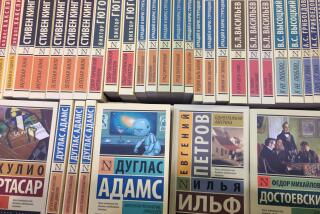Josef Stalin Is Born Again as a Hero of Soviet History
- Share via
Suppose a Soviet historian is allowed by an all-powerful government to publish a book arguing that Franklin D. Roosevelt’s war leadership had unnecessarily cost the lives of hundreds of thousands of American servicemen.
Now suppose that years have passed and another Soviet historian is allowed by the same government to publish a book depicting Roosevelt as a saint whose leadership made possible the Allied victory in World War II.
Where lies the truth?
Almost an exact parallel to this analogy is occurring today in the Soviet Union on the 30th anniversary of Nikita S. Khrushchev’s “secret” anti-Stalin speech to the 20th Soviet Communist Party Congress. The rehabilitation of Josef Stalin, which has been under way in the Soviet Union since Leonid I. Brezhnev ousted Khrushchev in October of 1964, may be a portent of new policies to be announced by Mikhail S. Gorbachev at the party’s 27th Congress next week.
Khrushchev’s speech was never published in the Soviet Union. Rather, it was read aloud to specially convened Communist Party meetings throughout the land. It was the American Central Intelligence Agency that obtained a copy of the speech and made it public. The former Soviet leader confirmed the speech’s authenticity in his memoirs.
About one-third of the 20,000-word speech was devoted to Stalin’s wartime leadership, which Khrushchev said had “led to serious consequences during the Great Patriotic War.” He attacked Stalin’s alibi for the early and bloody defeats of the Red Army because of the “surprise” German attack in the summer of 1941. It was no surprise at all, said Khrushchev, because Stalin had received ample warning from “our own military and diplomatic sources” that the Nazi attack was imminent. Had Stalin paid attention to these warnings and mobilized Soviet manpower and industry when there was time, Khrushchev contended, “our wartime losses would have been decidedly smaller.”
Recalling the invasion itself, Khrushchev noted that once the Nazis had entered Soviet territory “and military operations began, Moscow issued the order that the German fire was not to be returned (because) Stalin . . . thought that the war had not yet started, that this was only a provocative action on the part of several undisciplined sections of the German army, and that our reaction might serve as a reason for the Germans to begin the war.”
Referring to Stalin’s purges, Khrushchev described “the very grievous consequences (which) followed the annihilation of many military commanders and political workers during 1937-1941 because of (Stalin’s) suspiciousness and through slanderous accusations.”
Three decades later, a new Soviet leader has an entirely different view of Stalin. Last May, in a speech marking the 40th anniversary of the defeat of Nazi Germany, Gorbachev said: “The gigantic work at the front and in the rear was guided by the party, its Central Committee and the State Defense Committee headed by the general secretary of the All-Union Communist Party, Josef Vissarionovich Stalin.”
In what apparently contradicts the Khrushchev account, Gorbachev praised Stalin’s command of the economy, saying that his industrialization policy during the first five-year plan had made it possible for the Soviet Union to strengthen its “industrial and military might,” while his pre-World War II diplomacy had allowed the country to “win time” in order to be ready for Hitler’s eventual aggression.
Following the Gorbachev party line and totally ignoring the Khrushchev speech, the Soviet media is in the forefront of the restoration of Stalin in the Kremlin pantheon. In novels, television programs and films Stalin has been portrayed as the great military genius who made victory possible. Khrushchev is now a nonperson.
The actions taken by Gorbachev at the 27th Party Congress will give a clear indication as to the road he plans to take as the presently undisputed Soviet leader. My guess is that his praise for Stalin’s economic and political policies portend what could be called (as the late Edward Crankshaw once put it) “Stalinism without tears.”
It is no wonder that there is a saying in the Soviet Union that a historian of that country is one who can predict the past.
More to Read
Sign up for Essential California
The most important California stories and recommendations in your inbox every morning.
You may occasionally receive promotional content from the Los Angeles Times.













